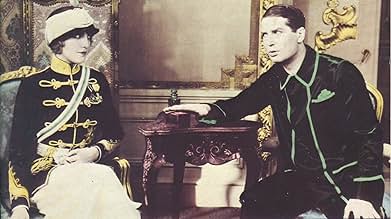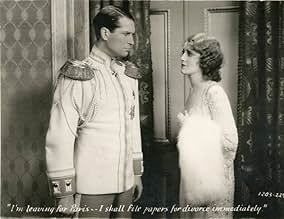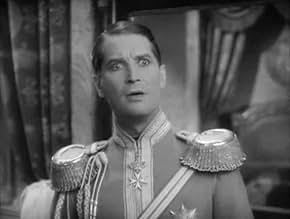AVALIAÇÃO DA IMDb
7,0/10
2,8 mil
SUA AVALIAÇÃO
O gabinete da rainha está tenso com a possibilidade de ela ficar solteirona. Relaxa quando ela se casa com um rude conde. Ele, não satisfeito como consorte, quando não tem respeitadas suas o... Ler tudoO gabinete da rainha está tenso com a possibilidade de ela ficar solteirona. Relaxa quando ela se casa com um rude conde. Ele, não satisfeito como consorte, quando não tem respeitadas suas ordens, cria dificuldades no casamento.O gabinete da rainha está tenso com a possibilidade de ela ficar solteirona. Relaxa quando ela se casa com um rude conde. Ele, não satisfeito como consorte, quando não tem respeitadas suas ordens, cria dificuldades no casamento.
- Direção
- Roteiristas
- Artistas
- Indicado a 6 Oscars
- 4 vitórias e 6 indicações no total
Carl Stockdale
- The Admiral
- (as Carlton Stockdale)
Albert De Winton
- Cabinet Minister
- (as Albert de Winton)
Avaliações em destaque
the sort of film that filmmakers to day are unable to make. it is too simple for them. it has a story with a beginning, middle and end. far too simple for the current crop of genius. the stars were real stars i swear they sometimes glittered. the directors famous touch was in fine form and even after many years i can remember walking home in a romantic glow. could anyone do the same after watching one of to days EPICS. i agree there must have been sound faults and other technical problems though i do not remember them. later on i heard a radio version also enjoyed. like far too many films of the past the love parade is unavailable to us on video or DVD. it may have been damaged and no longer usable though i do hope not. if there is any way to urge the current copyright owners to re-issue the film i would certainly like to be involved. are there other enthusiasts out there who agree?
An early musical (Ernst Lubitsch's first talkie), so the sound can be hard on the ears (especially Jeanette MacDonald's high notes). The plot as such is forgettable, but see it for the performances.
It seems odd to match Jeanette MacDonald's operetta singing with Maurice Chevalier's cabaret, but each gets their own numbers and they join in the middle for duets.
Lupino Lane and Lillian Roth do two wonderful vaudeville style song and dance numbers.
It seems odd to match Jeanette MacDonald's operetta singing with Maurice Chevalier's cabaret, but each gets their own numbers and they join in the middle for duets.
Lupino Lane and Lillian Roth do two wonderful vaudeville style song and dance numbers.
The Love Parade which was Maurice Chevalier's second feature film is as fresh today as it was in 1929 when it garnered a whole flock of Academy Award nominations. It was Paramount's prestige film of the year, in fact I'm not sure if any other Paramount features got any nominations for anything that year.
It was Ernst Lubitsch's first sound feature film and apparently the man with the famed Lubitsch touch hit the ground running in the new medium with a bunch of players who were also fresh to cinema because of the coming of sound. This was Jeanette MacDonald's film debut and while she's not billed over the title as Chevalier was, her part is every bit as important and as big as his.
Maurice Chevalier has been cutting a wide swath among the ladies of Paris where he's attached to the embassy of Sylvania. So much so that he's been recalled to Sylvania for a reprimand or so he thinks.
Jeanette MacDonald is the new young Queen of Sylvania and she's got to marry for reasons of state. As did many a female monarch, British ones like Victoria, Anne, and the two Marys all took husbands for reasons of state and the method they chose them was as much political as anything else. Only Elizabeth I managed to escape the marriage obligation.
While her diplomats look askance on Chevalier's romantic antics, Jeanette sees in him one grand candidate for marriage. If she's got to get married for reasons of state by God she's going to pick a husband who's going to be ready to romp at a royal command.
The Love Parade's musical score was written by Victor Schertzinger and Clifford Grey. The first notes Jeanette MacDonald ever sang on screen were from her hit song, Dream Lover. It's not the same song as Bobby Darin had a hit in the Fifties from. Film fans will recognize it as the flying theme that Cecil B. DeMille used as background music when Betty Hutton and Cornel Wilde were on the trapeze in The Greatest Show On Earth. Jeanette also sings March of the Grenadiers as she reviews her palace guard.
Chevalier's two big numbers were Paris Stays The Same and My Love Parade from whence the title comes. Both were written to suit his grand boulevardier style. Some comic numbers were written for Lupino Lane and Lillian Roth who are the second leads. Lupino is Chevalier's orderly and Roth is one of her maids. They make a cute pair with their impish behavior, aping their masters.
The Love Parade got six Oscar nominations, but did not win in any category and the categories were a lot fewer back in the day. It was up for Best Picture, Best Director, Best Actor for Maurice Chevalier, Best Sound Recording, Best Art Direction, and Best Cinematography. It also has a lot fewer overacted performances that were the norm in those early sound days. It was as if Ernst Lubitsch instinctively knew what to do with sound in film.
The story is about a Prince Consort and usually the model that is held up is that of Prince Albert for Queen Victoria. But that's not the road Chevalier wants to take.
It's a continental story and yet Lubitsch as he always did, made those stories appealing to American audiences. After 80 years, The Love Parade is still appealing.
It was Ernst Lubitsch's first sound feature film and apparently the man with the famed Lubitsch touch hit the ground running in the new medium with a bunch of players who were also fresh to cinema because of the coming of sound. This was Jeanette MacDonald's film debut and while she's not billed over the title as Chevalier was, her part is every bit as important and as big as his.
Maurice Chevalier has been cutting a wide swath among the ladies of Paris where he's attached to the embassy of Sylvania. So much so that he's been recalled to Sylvania for a reprimand or so he thinks.
Jeanette MacDonald is the new young Queen of Sylvania and she's got to marry for reasons of state. As did many a female monarch, British ones like Victoria, Anne, and the two Marys all took husbands for reasons of state and the method they chose them was as much political as anything else. Only Elizabeth I managed to escape the marriage obligation.
While her diplomats look askance on Chevalier's romantic antics, Jeanette sees in him one grand candidate for marriage. If she's got to get married for reasons of state by God she's going to pick a husband who's going to be ready to romp at a royal command.
The Love Parade's musical score was written by Victor Schertzinger and Clifford Grey. The first notes Jeanette MacDonald ever sang on screen were from her hit song, Dream Lover. It's not the same song as Bobby Darin had a hit in the Fifties from. Film fans will recognize it as the flying theme that Cecil B. DeMille used as background music when Betty Hutton and Cornel Wilde were on the trapeze in The Greatest Show On Earth. Jeanette also sings March of the Grenadiers as she reviews her palace guard.
Chevalier's two big numbers were Paris Stays The Same and My Love Parade from whence the title comes. Both were written to suit his grand boulevardier style. Some comic numbers were written for Lupino Lane and Lillian Roth who are the second leads. Lupino is Chevalier's orderly and Roth is one of her maids. They make a cute pair with their impish behavior, aping their masters.
The Love Parade got six Oscar nominations, but did not win in any category and the categories were a lot fewer back in the day. It was up for Best Picture, Best Director, Best Actor for Maurice Chevalier, Best Sound Recording, Best Art Direction, and Best Cinematography. It also has a lot fewer overacted performances that were the norm in those early sound days. It was as if Ernst Lubitsch instinctively knew what to do with sound in film.
The story is about a Prince Consort and usually the model that is held up is that of Prince Albert for Queen Victoria. But that's not the road Chevalier wants to take.
It's a continental story and yet Lubitsch as he always did, made those stories appealing to American audiences. After 80 years, The Love Parade is still appealing.
THE LOVE PARADE (Paramount, 1929) directed by Ernst Lubitsch, stars Maurice Chevalier in his second Hollywood musical (the first being 1929s "Innocents of Paris") and his first of four opposite Jeanette MacDonald in her screen debut. Jeanette plays Queen Louise of the Kingdom of Sylvania who immediately falls in love with Count Alfred Renard, a popular ladies' man, and soon marries this Parisian emissary in order to negotiate a loan from foreign power. After they wed, Alfred soon finds married life isn't what he has hoped, having to take orders from his wife as well as being second fiddle around the kingdom.
In spite of its age, THE LOVE PARADE is still quite entertaining early sound musical, consisted mostly of songs and limited dancing. With score composed by Victor Schewrtzinger and Clifford Grey, songs include, "Oo-La-La-La-La" (sung by Lupino Lane); "Paris, Stay the Same" (sung by Maurice Chevalier); "Dream Lover" (sung by Jeanette MacDonald/ ladies-in-waiting); "Anything to Please the Queen" and "My Love Parade" both sung by Chevalier and MacDonald); "Dream Lover" (reprise by MacDonald); "Let's Be Common" (sung by Lupino Lane and Lillian Roth); "The March of the Grenadiers" (sung by MacDonald); "Nobody's Using It Now" (sung by Chevalier); "The Queen is Always Right" (recited by Roth and Lane/ staff); "Dream Lover" (reprise by MacDonald); "March of the Grenadiers" (reprise by soldiers); and "My Love Parade" (reprised by MacDonald and Chevalier).
Running ten minutes shy of two hours, THE LOVE PARADE was nominated for an Academy Award as Best Picture, with Chevalier's nomination for Best Actor, but no wins. Other members of the cast consist of Eugene Palette, Edgar Norton, Ethel Griffies and Lionel Bellmore. Look fast for silent comic Ben Turpin in a funny bit; and future film stars as Virginia Bruce as the lady-in-waiting, and Jean Harlow as one of the patrons in the ballet theater.
Formerly presented on the American Movie Classics cable channel (January 1989-September 1996), AMC's host, Bob Dorian, noted an interesting piece of trivia that THE LOVE PARADE was the only movie in which Jeanette MacDonald smoked a cigarette on screen. Finally distributed to DVD in 2009, THE LOVE PARADE returned to cable television broadcasting once again, being Turner Classic Movies where it premiered February 3, 2010, with added bonus of two minute exit music in its fadeout.
Full of comedy wit and unexpected surprises in the Ernst Lubitch tradition, THE LOVE PARADE is still worthy film study and entertainment value after all these years. (***)
In spite of its age, THE LOVE PARADE is still quite entertaining early sound musical, consisted mostly of songs and limited dancing. With score composed by Victor Schewrtzinger and Clifford Grey, songs include, "Oo-La-La-La-La" (sung by Lupino Lane); "Paris, Stay the Same" (sung by Maurice Chevalier); "Dream Lover" (sung by Jeanette MacDonald/ ladies-in-waiting); "Anything to Please the Queen" and "My Love Parade" both sung by Chevalier and MacDonald); "Dream Lover" (reprise by MacDonald); "Let's Be Common" (sung by Lupino Lane and Lillian Roth); "The March of the Grenadiers" (sung by MacDonald); "Nobody's Using It Now" (sung by Chevalier); "The Queen is Always Right" (recited by Roth and Lane/ staff); "Dream Lover" (reprise by MacDonald); "March of the Grenadiers" (reprise by soldiers); and "My Love Parade" (reprised by MacDonald and Chevalier).
Running ten minutes shy of two hours, THE LOVE PARADE was nominated for an Academy Award as Best Picture, with Chevalier's nomination for Best Actor, but no wins. Other members of the cast consist of Eugene Palette, Edgar Norton, Ethel Griffies and Lionel Bellmore. Look fast for silent comic Ben Turpin in a funny bit; and future film stars as Virginia Bruce as the lady-in-waiting, and Jean Harlow as one of the patrons in the ballet theater.
Formerly presented on the American Movie Classics cable channel (January 1989-September 1996), AMC's host, Bob Dorian, noted an interesting piece of trivia that THE LOVE PARADE was the only movie in which Jeanette MacDonald smoked a cigarette on screen. Finally distributed to DVD in 2009, THE LOVE PARADE returned to cable television broadcasting once again, being Turner Classic Movies where it premiered February 3, 2010, with added bonus of two minute exit music in its fadeout.
Full of comedy wit and unexpected surprises in the Ernst Lubitch tradition, THE LOVE PARADE is still worthy film study and entertainment value after all these years. (***)
Count Alfred (Maurice Chevalier) has disgraced his home country of Sylvania with one too many scandalous affairs with married women, and the ambassador of Sylvania commands him to return home. Alfred's manservant, Jacques (Lupino Lane), begs to come along, and his master relents. Alfred, burdened with a newly acquired French accent that makes him sound most un-Sylvanian, fears the wrath of his queen (Jeanette MacDonald). But instead of having him shot, she falls in love with him, and he with her. The entire kingdom, which has had nothing on its mind except seeing the queen get married, is thrilled. As Jacques and Lulu the maid (Lillian Roth) conduct their own romance, reveling in their commonness, Alfred discovers at the altar that his own marriage will be most uncommon - and a dire threat to his manhood. He may be marrying a queen, but he most definitely won't be a king.
Ernst Lubitsch directed this marvelous technical and artistic achievement back when other early sound films were still stumbling along. Four outstanding performances from four witty and charming performers (Chevalier, MacDonald, Lane and Roth) grace this lavishly produced musical comedy with its champagne-bubble songs and sexually-charged dialogue.
Ernst Lubitsch directed this marvelous technical and artistic achievement back when other early sound films were still stumbling along. Four outstanding performances from four witty and charming performers (Chevalier, MacDonald, Lane and Roth) grace this lavishly produced musical comedy with its champagne-bubble songs and sexually-charged dialogue.
Você sabia?
- CuriosidadesConsidered by many to be the first musical film in which the songs were integrated with the story.
- Erros de gravaçãoThe fact that Count Alfred (Maurice Chevalier) speaks with a French accent, even though he is not supposed to be French, is really not an "error". However, by adding a scene to attempt to explain this anomaly, it only serves to highlight the accent discrepancies in the casting. For instance, in contrast to the accent discrepancy with Chevalier's character, no one seems to notice that his French servant, Jacques (Lupino Lane), speaks British English with no discernible French accent.
- Citações
Queen Louise: Why am I always awakened from my dreams?
- Versões alternativasThere is an Italian edition of this film on DVD, distributed by DNA Srl: "IL PRINCIPE CONSORTE (1929) + AMAMI STANOTTE (1932)" (2 Films on a single DVD), re-edited with the contribution of film historian Riccardo Cusin. This version is also available for streaming on some platforms.
- ConexõesFeatured in The Love Goddesses (1965)
Principais escolhas
Faça login para avaliar e ver a lista de recomendações personalizadas
- How long is The Love Parade?Fornecido pela Alexa
Detalhes
- Data de lançamento
- País de origem
- Idiomas
- Também conhecido como
- The Love Parade
- Locações de filme
- Empresa de produção
- Consulte mais créditos da empresa na IMDbPro
Bilheteria
- Orçamento
- US$ 650.000 (estimativa)
- Tempo de duração1 hora 47 minutos
- Cor
Contribua para esta página
Sugerir uma alteração ou adicionar conteúdo ausente



































